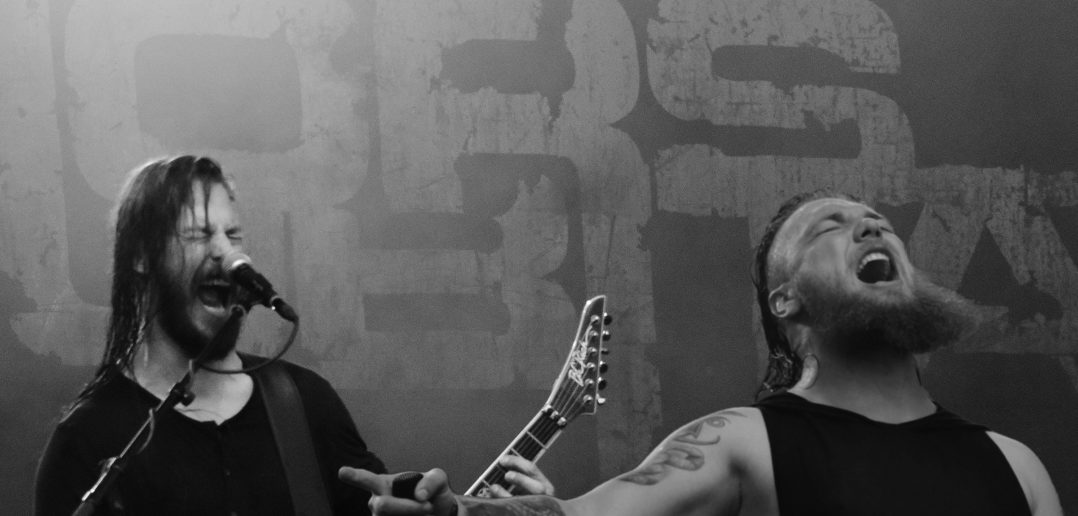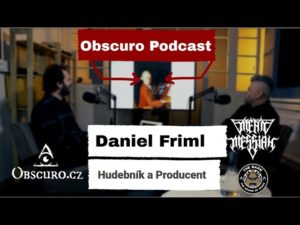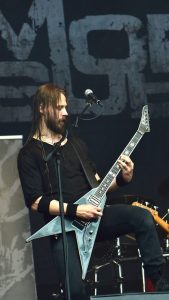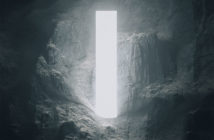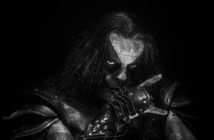Their latest album ‘Into the Pitch Black’ is a master piece being highly appreciated by fans and reviewers. The lyrics, mostly written by vocalist Eemeli Bodde, often deal with some kind of disappointment in recent social structures and developments. Yet there always is hope Mika Lammassaari points out even stronger than Eemeli who joins our interview later.
The first time I met Mika was after a Wolfheart show quite some time back. He looked at the collage, I asked the band to sign and the first thing he said was how happy he was to find a good photo of their drummer on it! What an amazing team player he is, I thought. Would he remember this moment or the collage? Nummirock, 2018. Mika laughs and recalls the collage immediately. “Awesome, yes”, he says very excitedly and takes a closer look noticing that a photo of him also making the background of the collage so that he is the only one who is shown twice. Mika points that now he feels a bit weird that he mentioned Joonas (Kauppinen) first but then again it still is important to him that the one band member usually not covered much by photographers is here shown with a good shot.
“I am just a member of the unit which is Wolfheart, so. I wouldn’t consider myself above anybody else in the band though.” There is a slight shiver in his voice. Low. But there it is and humble Mika a bit uneasy being in the focus back than when he is “only” a member of the unit.
Time – Hitting the Nail on the Head!
“Actually I wonder how you manage personally at all”, shifting the focus on the multiply time-consuming fact Mika being active in Wolfheart and Mors Subita while he has a day job and family as well, naturally. „… and most likely at times you’d like to do these overrated things like eating or sleeping.“ Mika laughs: „You’re hitting the nail on the head! That’s the point. I have given it a lot of thought lately. I should have some rest in between. And this summer I am having a one-week holiday“, he points out but I cannot hide my irony.
„A whole week, yeah! How generous!“ – „Next month I am having one week of from everything.“ „Great“, I agree while Mika reduces the term „everything“ to reality: „I might compose a little bit if I feel like it. I am probably having my acoustic guitar with me but other than that I am only focusing on myself and my family!“
„Great.“ – „Probably“, he hurries to say, „not in that order. My family and then myself.“ I can’t help it. I am laughing and Mika does smile too. „I don’t know. It’s a lot of work. Actually at the moment I am studying mechanical engineering so that’s … „, and while he is searching for the perfect wording, I point out that studying alone was more than enough to manage for many others without two bands and family at all! „I am really waiting to get back to work again”, Mika explains „School is freaking hard“, he adds laughing. „When you’re over 30 it’s becoming harder and harder I think.” I nod, and mention my day job at a university, so Mika points out: „It’s hard work. The price is high but the end product is always worth it – like playing at Nummirock which has been for the first 15 years only a dream of ours, of mine, too. Be able to play here. It’s been a long road.“ I can hear and read in Mika’s face that he really is happy saying so.
Aggression – “Let Go of That Feeling”
Thinking of his tight schedule and the aggressive Mors-Subita sound I wonder how Mika deals with aggression personally. “Is music your only channel of aggression or do you?” – “Opposite. Opposite. Channelling aggression is – it sounds bad on paper but it is quite the opposite. You know channelling aggression makes you let go of that feeling.”
“Of course and I entirely agree.” – “But aggression can also be expression of many things, excited, depression and aggressive music can just be the vessel to let it go. There can even be joy. Overwhelming joy behind that aggression.”
“To me it is like things crushing together. You never know in the first place what crashes together. But the crash is some kind of aggression based on the energy of the crash. So how do you process your feelings into your music?” Mika is chewing on this one: “It’s really hard to explain how certain musical expressions are born. Like I said, it can be whichever emotion that is caught inside you, that you need to push out. But I rarely feel … It’s really hard to tell these emotions apart when you coming up. Sometimes it’s easier when I’m composing. Sometimes, let’s say, 15 or 20 % of the time I can feel what’s coming out, which emotion it is. But sometimes it’s more difficult to say which one it is. Because, like I said, the aggressive parts can also be an image of for example joy. But it’s only, you need to have your flash on goose bumps and you need to have your hair stick out and you know when you’re composing. Otherwise it’s not good enough.”
“Uhm, understood. Then how do you decide which songs you will present to the rest of the band?” “It’s becoming harder and harder all the time.”
“Because your improving thereby feel more confident with your results?” – “I try to push myself as far as I can. Everything I got before, I present it to the band and the way we proceed is quite black and white. If I don’t get any response, it’s shit.” I frown. “If somebody says ‘this is pretty ok’ or somebody say ‘yeah, good enough, quite nice melody. Quite nice riff’ than it’s good to go. But usually silence means that it is complete shit. And then I just have to kill my darlings and …”
“A Really Heavy Riff – It’s Not Fast”
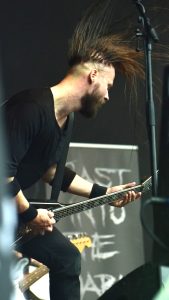
Mika Lammassaari. Photo: Ms Cesar Little
But then I would like to know how important speed is to Mika as I find even the slower songs of Mors Subita are still rather quick. “Beat?!” he breathes a little louder. “Speed”, I repeat. “Ah, speed. Not that important anymore. You can hear it by comparing the last two albums of Mors Subita or the second and the third album. There is a lot of more variety in the song tempos on the new album. I am trying to let go off playing full blast all the time”, he explains carefully. “We have always had slower songs before already. But the variety of the tempos hasn’t been there. Speed is not that important any more that becoming more like a funny trick, you know. Speed is important in some cases. But nowadays I feel if I want to write a really heavy riff it’s not fast. It’s not fast at all. It’s usually slower. But you can like I said before it was more like: ‘Look what I can do’, going fast all the time. Nowadays it’s more about expression, more about emotion, more about bringing the heaviness from other elements than just speed.”
“There is an individual balance each musician has, the balance how you prefer to express yourself more by playing life, fully body exposure or composing, the stronger creative part. Where is yours? More on the side of playing on stage or more on the side of composing?” – “Good question. Really hard one!” He takes a break to word his so far apparently subconscious balance. “I enjoy both. But”, he pauses again and his breath sounds slightly heavier than before. “… I cannot say 50 : 50 because I have not played enough yet! Live! Even though we’re touring all the time but I feel like we haven’t yet reached the same level or there has only been a couple or half a dozen gigs that have given me the same sensation that I get from makings a really satisfying melody or song. So there is similar emotions involved of the same satisfaction but at the moment I think I am getting it more from the compositions from that stage. But I l o v e playing live, of course. But it’s just two completely different worlds. And when I am home, when I am composing it’s always the same kind of surrounding, so. Always the same situation or at least I am in pretty much the same state of mind. But when I go play live it depends on the venue, on the schedules, on so many different elements that it’s always in a way or another, it’s different. So it’s hard to compare those two. But of course, there’s similar feelings of satisfaction involved.”
“Can you think of a setting to stop composing …” – “No!!!”

Mika Lammassaari. Photo: Ms Cesar Little
“…or is this something that has to come out of you?” – “We were just discussing with Juho, when we were driving here, about what would we do if we lost our arms so we couldn’t play anymore. Lost our vocal cords or something. It wouldn’t stop me from composing at least, but start doing like EDM or something. It would still go on. There is no … or the self-expression would come out some other way. Just I don’t know any other way to bring it out yet. Solitary would probably help to find some way but …” –
As he smiles I can’t help laughing. “Solitude seems not at the schedule at the moment.” Mika frowns to agree and adds “it’s probably not painting. Probably not dancing.”
“But then you guys have a sort of choreography on stage, don’t you?” – “Yeah, we’ll see if we will have it today because I broke my neck a couple of days back.” – “Oh no!” – “Yeah, we’ll see. I was working under my car for two days in a shitty position and then I cracked it. And now I can hardly turn my head.” I am sorry but I am laughing. Mika takes it with irony: “But usually there is no cars coming from the right side. I don’t have to look that way. Usually.” We detour a bit speaking of cars, and festivals and some Finnish traits. Mika supposes that Finns, often introverts, were unlikely to answer my personal questions. But they have always done so far, could not resist asked in particular about their musical output.
“Tough moment when you thrash one your of songs?” – “Yeah … it is but then it’s easier nowadays. And I know all the guys so well. And I know which kind of stuff they like. Of course, the first goal is to make the guys satisfied with the songs we’re gonna perform or we’re starting to rehears. I’m happy if the band guys are happy as well.” So we’re back to the great team player I think but ask actually:
“Are you presenting the complete songs with arrangements and all?” – “Only the musical parts. Usually I try to make it as ready as I can. As album-ready as I can! Also Ville wants me to put as much of my drum arrangements as I can and he can take it from there. But Eemeli usually writes all the lyrics and arranges the vocals as well which is, I think, is the best way. Because the vocalist has to feel and know what he is singing about. I only come to help.”
“You did quite some lyrics at the recent album”, I point out. “I only did two songs because I made it to help Eemeli because he had some trouble with those songs so I just gave it a go and Eemeli liked it. So we stuck with it. But initially I don’t make any vocal arrangements. For the first album we worked a lot more hand-in-hand with HP. Now pretty much everything is up to Eemeli.”
Dynamics – “Branching to Each Other”
“And how would you consider Mors Subita’s dynamics and structure in general?” – “Oh, that’s a tight unit, yeah, a tight unit! We’ve been with the same line up for … has it been … in almost five years already with Ville (Miinala). Me and June (Mika Junttila), we go way back. We were at the army together and have been playing together since so, too Mika. You know we were the oldest members of Mors Subita. But with Eemeli and Ville, we’re a very tight unit at the moment. And it’s getting even better, and better as time proceeds. And now we have Juho (Näppä) also, who is a big part of the band already.” We laugh as Mika is getting a bit more relaxed. “I would consider Mors Subita as it is Wolfheart: It’s really well-oiled machine and a really tight unit from which you cannot take one part out. It doesn’t work. It’s not the same anymore.”
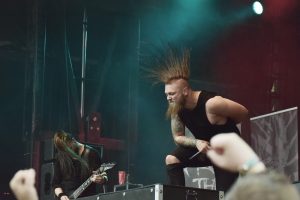
Mika Lammassaari, Eemeli Bodde. Photo: Ms Cesar Little
“So everybody is a wheel in the machinery and surely will have functions beyond music, right?”- “Yes, yes, there is. I take care of most of the recordings except usually, we record drums in another studio with another engineer usually. I do usually most of the recordings and production. June does most of the art designs, the …” – “Really? That’s demanding!” – “Yeah, he did that shirt also”, Mika replies pointing at me. “Wow! That’s great.” – “And he does most of that. He has the visual touch really. He’s been doing that for many years already and it’s been working great for us. And there is many other tasks. Everybody does some of the basic jobs in a band. It’s like a business. It’s like a company.” – “Yes, of course.” – “You have many things to do except the music. Music comes of course first, but there’s many tasks and everybody is very involved in keeping the band moving.”
I explain that in my experience as soon as a band is up for more than meeting in a rehearsal place for themselves only, a band has to deal with lots of tasks coming along with playing on stage or releasing music or both. “Right”, Mika replies, and I continue asking him how he managed himself as lately there must have been a hell lot of tasks to be done as both his active bands have been very successful and active lately. “It might come as a surprise for many young bands how much work there actually is even though we’re a small band. It doesn’t mean that the effort is less quite the opposite.” I agree. “Because we’re doing everything ourselves. Now we’ve had some help with the gig bookings from NEM Agency and of course we’re having Inverse Records helping with the album sales and all that. So it’s been really good for us”, Mika explains and his faces brightens to a smile. “Now we can focus even more on the music itself”, follows enthusiastically.
So I sum it up: “In the beginning it was only the music, then you got out and so a lot of other stuff needed to be done, too. So the music, of course, did not become less important but has had a smaller share of your time and effort. And that must hurt?” – “That’s why we try to delegate as much as we can to give the music more room. That’s why, like you said, everybody has their own tasks in the band. And everybody is a very reliable member like that in the band in that way because everybody has the reliability of having any task that is given to him or her.”
“So what’s up?” Eemeli asks arriving.
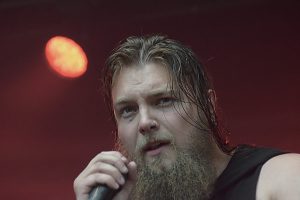
Eemeli Bodde. Photo: Ms Cesar Little
I take the chance to go for the band dynamics again as another person might have another focus or angle on it. ”Oh, very tight” Eemeli kind of hushes while I ask for several potential qualities. “Oh well, actually, we have been playing like together for many years now and I think we have welted like really good together so we work really effectively when we do. We don’t practise much. Maybe we don’t discuss things as much as others do. But when we do everything just locks on and it’s like really effective and that’s just because we have been doing things this for so long already with each other. And I’d say we all bring our own aspects to the team. And everybody can, hm, how would I say it, like everybody can express themselves like as much as they want and then everything just works. When some guy brings an idea up, ‘Hei could this work?’, it usually works. Well, I don’t know. We know what we’re looking for so and we know what like everybody can provide to the band. So everything just works really smooth.”
“Like it has grown together?” – “Yeah! That way exactly! It’s like an old tree. Basically you just branch to each other”, Eemeli says. What a beautiful and strong image for a band.
Darkness – ‘Into The Pitch Black’
Turning to Mika: “Coming back to Mors Subita and the new album, actually one of the first photos I saw of you off stage is with your little one still being a baby in your arms. In my perspective raising children is one of the most optimistic acts and requires also this incredible optimism for the future. But then the lyrics on “Into the Pitch Black” and for example the title track seem to come from a quite pessimistic attitude. With children you agree to a very long lasting responsibility while “Into the Pitch Black” feels to me in tendency suicidal even. How does this go together?” – “Well, ‘Into the Pitch Black’ is more. It’s not only black and white. It can mean many things but mostly it’s about overcoming the fears, of overcoming the hard times, overcoming the sensations of letting go, you know. Letting go of your past, letting go of yourself, of your former self. But for me the inner meaning of ‘Into the Pitch Black’ is actually the like a combination of being overwhelmed with lots of responsibility, exhaustion. When your mind lets go but your body’s still there. It’s that state. But Leo is actually one of the main reasons that keeps the mind together.”
“So he is the remedy?” – “Yes. He is one of the main remedies. But “Into the Pitch Black” is not literally about my life. You know it’s the state of the youth right now, as I see it. And “Into the Pitch Black” is more about letting go of those feelings rather than clinching into it. “Into the Pitch Black” is about bouncing back.”
“Is there a specific incident behind the song, Mika?” – “There wasn’t before but my father passed away the day before the first show of this tour. That kind of became the top bond of that. Those feelings. Yeah, all people go through hard times and there is always a remedy to it whether it’s a person, whether it’s music, whatever it is. Whatever you can use you should use it. I don’t mean any substances but sometimes that works also but there’s many remedies and there is always hope. There is always light in the end of the tunnel”, he says determined.
Vultures – F*! Elitists!
The lyrics of ‘Vultures’ (lyrics by Eemeli) caught my attention. Studying them over and again my impression moved from personal to class-related and in the end appeared to be some kind of curse. Eemeli humms a couple of times during my introduction. “Well, Vultures is all about like it’s a political statement pretty much. Well it’s towards elitist people who think that they are above some other guys, like I don’t know, like us. No? Maybe?” He laughs and I nod to show I that I agree with him so far. We are normal people. No more. “Yeah, well, I mean, there are actually people that think that they are actually something bigger than they actually are. And that’s like … the song is for them, basically. It’s a big middle finger for them.” Eemeli is not the super cool guy I had somehow expected. He is emotional, determined in his opinion and apparently excited. Then again, the natural habitat of a vocalist is the stage. “You should think of this like these things.”
“Then why vultures? To me these birds are the ones cleaning up the let’s say party left overs. That makes them very valuable to the society and thereby to quite the opposite of the context of your lyrics.” – “Yeah, why vultures. Well they prey on like defenceless corpses and basically the people like those who are like deprived and stuff like that, they can’t do much about these vultures.” I get the point and laugh. Yeah, indeed, a corpse can’t defend anymore. Very impressive image he draws here. “Like the elite people. They usually have more like money, more power, more influence over people, so that’s basically it.” Speaking of my rather social image of the birds Eemeli says: “Yeah, I mean, it could look that way, too, but for me it’s about the elitist people, yeah. That’s the main point for me. But yeah, sure.” He laughs too, as we appreciate the new perspectives.
Hope – ‘As Humanity Weeps’
I understood that most of the songs deal with the recent situation of our world and society not being entirely comfy to live in both. “We’re just fighting oppression and suppression pretty much – from the ordinary person point of view”, Mika says, “We’re not getting too much in the politics. But everything is related in the end so it is easy to talk about politics if you only think about your own life. How the global atmosphere is affecting your own life. You cannot hide from it.”
“No, not possible anymore and looking down: not with all the devices here on the table.” – “Yeah, there is a bigger picture in some songs and some songs are really personal I think”, Mika confirms.
“But still to me all the songs and themes fit together quite well. Not the bright-shining, happy something. There is some darkness in all the songs”, I point out and Mika replies “Hm, but there is also hope. Yes, like the brighter sounds ones in the music and the brightness hidden between the lines of the lyrics.”

Eemeli Bodde. Photo: Ms Cesar Little
“Eemeli, do you agree with Mika’s optimism?” – “There is always hope”, Eemeli points out. “Just a little”, he adds laughing in a somewhat witty manner, “but there’s something.” Smiling I come to my point: “So how much hope is left then? And where do you actually see the hope.” – “I don’t know”, Eemeli begins. “Well the lyrics on that album are pretty much like ….”, he inhales audibly and pauses to start over his statement: “Well, when I wrote the lyrics I was like searching for the thing that would give me hope for the future and stuff like this. Really. I had to search for it for a while and then I did not really like find a reason to feel hopeful.” Despite the serious if not heavy topic Eemeli smiles while speaking. “but I think there is like If we could improve we could do a lot of things better … as humans … as humanity. Maybe? We should improve a lot.” His facial expression has become more serious now. “Well that’s the thing that gives me hope that there still is a chance that we can actually do something.” There is a smile again but it does not speak of comfort or ease. It has an air of questioning his own words and the way Eemeli exhales here underlines the cynicism he sees in the little hope.
I am reminded to a German proverb that says that adults lend the world from their children. “Yeah, true”, Eemeli says and after a pause I ask him. “Can our children or their generation still make it?” – “Yeah, yeah” I hear in an excited tone. “Or is the task too huge already?” – “Yeah, they can actually. There are a lot of big changes that need to be made like the way we spend nature, like the way we treat other people, everything like this. If we could change these things, well not too fast, but quite fast, then there is maybe a chance to them. Maybe. I don’t know. This could go on for like a long time but we need to improve a lot, I think. Yeah!” I wonder how much he has to convince himself with this last word.
Quite a heavy end for an interview. But then this what Mors Subita’s songs are about although there is always hope as most of all Mika is not getting tired to point out. And as we exceeded our slot by far Eemeli had to hurry back to stage. Their show slot is approaching and I was very much looking forward for to experience them live. Would their show be as energetic and gripping as their songs? Before meeting Eemeli here all I knew was his face from the videos. He comes off as bad-ass with a wild and evil expression underlining perfectly the aggressive music and attitude of the lyrics. My interviewee, however, has a friendly if not dear face which has made me wonder ever since how they manage to turn into the face we can all watch in the videos. The show did not lift this secret. But Eemeli is – no doubt – a very charismatic frontman and their show is as energetic and passionate as I hoped. Pure pleasure.
Watching who is coming and going on and off stage I couldn’t miss the numerous familiar faces. If in Oulu nobody is nobody than the Mors-Subita tree branched out far beyond the band and far beyond the town of nobodies. So we’re back to hope resulting from the community we spoke of!
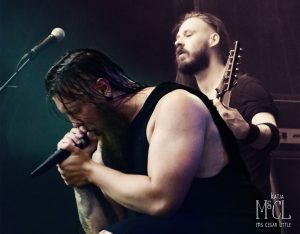
Eemeli Bodde, Mika Lammassaari. Photo: Ms Cesar Little

